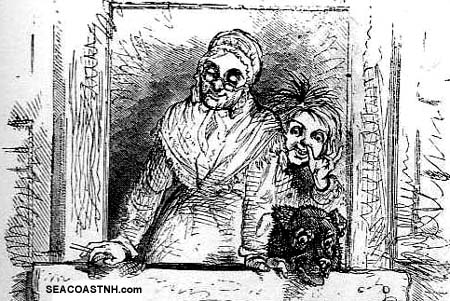|
FRESH STUFF DAILY |
|
|
||
|
|
||
|
|
||
|
SEE ALL SIGNED BOOKS by J. Dennis Robinson click here |
||
Page 3 of 3
But the American boy as invented by Aldrich, Shillaber and Twain was another thing. These 19th century boys acted young because they were young, usually between 10 and 12 years old. They lived in a time when many boys began their careers as early as 14 or 16. They were educated polite boys in their final wild years, not victims of arrested development like their modern counterparts. In his book Being a Boy (1877) Charles Dudley Warner described boyhood as the ultimate condition, except that "just as you get used to being a boy, you have to be something else." It is not by accident that the boy book was born here. Portsmouth tumbled into an economic decline at the turn of the 19th century, just as these future authors were growing up on the New Hampshire coast. Shillaber, Aldirch, publisher James T. Fields and others all left to make their fortunes elsewhere. Years later they attended a series of Portsmouth "homecoming" events during which these accomplished literary men shared nostalgic stories of their beloved home town. This nostalgia for the past was especially strong during the fast-paced, noisy, sooty Industrial Age. Portsmouth changed very little and so came to represent the happier and simpler "good old days". BP Shillaber made this point in a few lines from a poem recited at the 1853 "Return of the Sons" celebration when he said: And memories, like railroad trains For Shillaber, tales of the Indian raids at "The Plains" in Portsmouth were more real to him than bigger events in history. Shillaber’s writing, like that of Aldrich and Fields and local historian Charles Brewster is thick with references to life in Portsmouth. Often their boyhood memories intersect, providing vivid pictures of early Portsmouth that should be studied and reprinted. Aldrich, for example, tells the story of Binny Wallace, a fictional boy who was swept out to sea by the fast Piscataqua tides. James T. Fields, who would become the most influential literary publisher in Boston, recalled that his entire Portsmouth class and their teacher were lost at sea during a Sunday picnic outing. Stories of snowball fights, club houses, sledding races and school thrashings appear again and again in these boy books, poems, speeches and letters. It is a rich untapped vein for local historians. Portsmouth already has a boy book museum of sorts. The Thomas Bailey Aldrich Memorial on Court Street opened in 1908 and is now part of Strawbery Banke. Each room in the house has been carefully reconstructed to match the descriptions in "The Story of a Bad Boy". For a century these empty rooms have been a silent shrine to a book few now read and an author nobody knows. Yet Aldrich’s book still explodes with the sound of firecrackers and canon, shrieking adults, and laughing children. His depiction of "the human boy" is as relevant as ever, and Portsmouth’s place in literary history deserves to be celebrated, not entombed. Perhaps this building could be re-born as the Bad Boy House, a hands-on museum that celebrates and explores the energetic life of the "human boy". Instead of empty rooms and old furniture, the Aldrich House might bring the history of the American boy to life. Tom Bailey could invite his friens Ike Partington, Huck Finn, Tom Sawyer and rascals to visit. Real boys and even girls could learn to tell their own stories. Teachers, psychologists, anthropologists, scientists and historians could debate how boys have or have not changed. Kids could just have fun while Portsmouth, at last, gets the credit it deserves. Copyright © 2006 by J. Dennis Robinson. All rights reserved. This essay was abridged from the author’s recent address to the Portsmouth Historical Society entitled "Lively Boys! Lively Boys!" For further reading on this topic the author suggests the book Being a Boy Again: Autobiography and the American Boy Book by Marcia Jacobson, University of Alabama Press, 1994.
Please visit these SeacoastNH.com ad partners.
News about Portsmouth from Fosters.com |
| Friday, April 19, 2024 |


|
Copyright ® 1996-2020 SeacoastNH.com. All rights reserved. Privacy Statement
Site maintained by ad-cetera graphics

 Link Free or Die
Link Free or Die



















